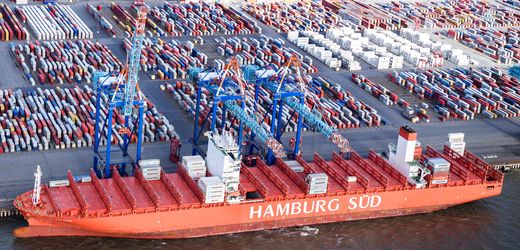
The corona crisis has ripped in the past year, deep holes in the German export balance. Exports of Goods dropped sharply compared to 2019, an increase of 9.3 percent to 1204,7 billion euros, as the Federal Statistical office on Tuesday announced in Wiesbaden, Germany. It was the strongest decline since the global financial crisis in 2009. At the time, the exports of goods fell by 18.4 per cent. The import volume decreased in the past year, to 7.1 percent to 1025,6 billion euros.
The decline in exports is mainly due to the start of the pandemic: In March, the border had closures, disrupted logistics and interrupted supply chains brakes, the export business is significant. Although the exports increased after eight months in a row, but it was not enough, the break-in balance.
Most recently, in December, exports rose 0.1 percent month-on-month. Contributed to the positive development of the business with the world’s two largest economies: exports to The people’s Republic of China grew in December by 11.6 percent year-on-year month to 9.3 billion euros, in the United States by 8.4 percent to 9.2 billion and for the first time in ten months.
Good Recreation Opportunities
However, recovery is in sight: The many experts predicted the global economic recovery from the recession of the year 2020 is likely to play the exporters in the cards. For Germany’s most important trading partner China, for example, is not expected this year, a growth of around 8.5 per cent. Also, the U.S. Economy is expected to grow vigorously. According to the foreign trade Association BGA expected for this year, as last, with a significant Plus. The pre-crisis level is to be achieved, therefore, by the summer of 2022 and again.
However, the pre-crisis level was not reached in the foreign trade yet again, said Sebastian Dullien, Director of the IPM-Institute for macroeconomics and economic research. “In addition to the ongoing effects of the corona crisis, play two special factors: The Brexit and supply shortages in semi-conductors. When you trade with the United Kingdom is to be expected for the first few months of 2021, once again, with a noticeable decline. The shortages of the Chips currently hamper the car’s production, and dampen exports.”
In January, had lightened the mood among German exporters even more significantly. The Ifo export expectations of the industry rose by 1.9 points to 6.0 points. This was the best value since October. Among other things, a robust industrial economy and the global Impfstart led to a cautious optimism.
While the industry was broken into production in the first Corona-wave, continued the work in most of the companies in the second wave. The borders remained open for trading. The Export is in addition to the private consumption is an important pillar of the German economy.


